Have you ever wondered why your furry friend loves to shower you with slobbery kisses? Well, the answer lies in the fascinating behavior of dog licking. Dogs have been licking humans for centuries, and it serves various purposes in their canine world. So, let’s dive into the intriguing world of dog licking behavior and uncover the reasons why your dog licks your face!
Key Takeaways:
- Dogs lick their owners as a form of communication, showing affection, and seeking attention.
- Licking can also serve as a calming and self-soothing behavior for dogs.
- Grooming and taste exploration are additional reasons why dogs may lick their owners’ faces.
- Excessive licking or problematic licking behavior may indicate underlying health issues.
- Understanding and addressing your dog’s licking behavior can help strengthen the bond between you and your furry companion.
Reasons Why Your Dog is Licking You
Dogs have various reasons for licking their owners, and it can reveal a lot about their behavior and emotions. Understanding these reasons can help strengthen the bond between you and your furry friend. Here are some common reasons why dogs lick their owners:
- Communication: Licking is a way for dogs to communicate their needs and emotions. Whether they’re hungry, thirsty, or need to go outside, licking can be their way of getting your attention.
- Affection: Licking is a sign of love and affection from your dog. It’s their way of showing you how much they care and reinforcing the strong bond between you.
- Exploration: Dogs use their tongues to explore their environment, including your face. By licking you, they’re gathering information about your scent and taste, satisfying their curiosity.
“Dogs lick to communicate, show affection, and explore their surroundings.”
It’s important to note that excessive licking can sometimes indicate underlying issues, such as anxiety or health problems. If your dog’s licking becomes obsessive or persistent, it’s always a good idea to consult with a veterinarian to rule out any potential concerns.
| Reasons Why Your Dog is Licking You | Description |
|---|---|
| Communication | Dogs lick to communicate their needs and emotions, such as hunger or the need to go outside. |
| Affection | Licking is a way for your dog to show their love and strengthen the bond between you. |
| Exploration | By licking your face, dogs are exploring their environment and gathering information through taste and scent. |
Remember, every dog is unique, and their licking behavior might have personal nuances. By observing and understanding your dog’s licking patterns, you can build a deeper connection and ensure their well-being.
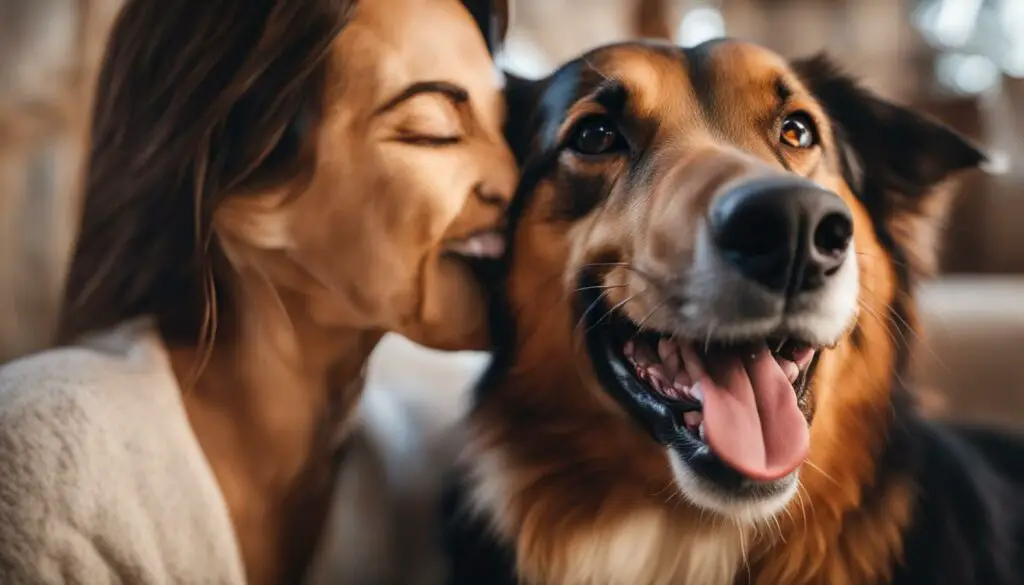
How to Encourage Positive Licking Behavior
If you want to redirect your dog’s licking behavior or establish boundaries, try these tips:
- Provide alternative ways for your dog to seek attention, such as playing with toys or going for walks.
- Teach your dog basic commands, like “sit” or “stay,” to distract them from excessive licking.
- Reward your dog with treats or praise when they display calm behavior.
- If your dog’s licking becomes problematic, consult with a professional dog trainer or behaviorist for guidance.
Communication through Licking
Licking is a primary form of communication for dogs, allowing them to express their needs, emotions, and intentions. When a dog licks their owner’s face, hands, or other body parts, they may be trying to convey important messages. It’s crucial for dog owners to pay attention to their dog’s licking behavior and understand its meaning in order to effectively communicate with their furry companions.
Table: Interpretation of different types of licking behaviors
| Licking Behavior | Meaning |
|---|---|
| Short, quick licks | Expression of affection and a desire to bond |
| Gentle, slow licks | Seeking attention or trying to communicate a need |
| Vigorous, prolonged licks | Possible sign of anxiety or stress |
| Excessive licking | Potential health issue or compulsive behavior |
Dogs may lick their owners to indicate hunger, thirst, or the need to go outside. It can also be a way for them to seek comfort and communicate their anxiety or stress. By observing the context and other accompanying behaviors, owners can better understand their dog’s intentions behind the licking. However, it’s important to note that excessive licking, especially when it becomes compulsive or disruptive, may require professional help to address underlying issues.
Training for appropriate licking behavior
Training plays a crucial role in redirecting a dog’s licking behavior and teaching them appropriate ways to communicate their needs. Positive reinforcement techniques, such as rewarding desired behaviors, can be effective in guiding dogs to express their affection without excessive licking. Consistency, patience, and clear communication are key when training a dog to understand boundaries and communicate in a manner that is acceptable to both the owner and the dog.
Grooming Behavior
Dogs have a natural instinct for grooming themselves, and this behavior extends to their interactions with their owners. Grooming is an important part of a dog’s daily routine, as it helps them keep their fur clean, free from dirt, debris, and parasites. When your dog licks your face, it can be seen as a form of grooming behavior.
Grooming not only helps dogs maintain their hygiene but also serves as a way for them to show their affection and strengthen their bond with their owners. When a dog licks your face, it can be a sign of trust and love. This behavior is their way of saying, “I care about you, and I want to take care of you.
While grooming behavior is generally harmless and a natural part of a dog’s instincts, excessive licking can become a problem. It can lead to skin irritation and may indicate an underlying issue that needs to be addressed. If your dog’s licking becomes excessive or obsessive, it’s important to consult with a veterinarian to rule out any potential health problems or behavioral issues.
| Pros of Grooming Behavior: | Cons of Excessive Licking: |
|---|---|
| 1. Helps keep fur clean and free from dirt | 1. Skin irritation |
| 2. Strengthens bond between dog and owner | 2. Underlying health issues |
| 3. Shows affection and trust | 3. Obsessive behavior |
It’s essential to strike a balance when it comes to grooming behavior. Encourage your dog’s natural instinct to groom, but also keep an eye out for any excessive licking that may require intervention. Regular grooming sessions, including brushing and keeping your dog’s coat clean, can help minimize the need for excessive licking.
Taste and Exploration
When it comes to dogs licking their owners’ faces, taste and exploration play a significant role. Dogs use their tongues as a sensory tool to gather information about their environment. By licking their owners’ faces, they can taste different scents, textures, and substances on the skin. This behavior allows them to explore and understand the world around them.
Just like humans use their hands to touch and feel, dogs rely on their tongues to explore their surroundings. It’s their way of getting to know their owners better and understanding the smells and tastes associated with them. Think of it as a dog’s way of saying, “I want to know more about you!”
“Dogs lick their owners’ faces to satisfy their curiosity and get a taste of the things that interest them,” says Dr. Sarah Thompson, a veterinarian with years of experience.
So, the next time you catch your furry friend happily licking your face, remember that it’s not just a sign of affection but also a way for them to discover the world around them. It’s a fascinating behavior that showcases their innate curiosity and their desire to engage with their environment.

| Reasons for Dog Licking Behavior | Explanation |
|---|---|
| Curiosity and exploration | Dogs use their tongues to taste and gather information about their environment, including their owners’ faces. |
| Bonding and communication | Licking is a way for dogs to bond with their owners and communicate their needs, emotions, and intentions. |
| Seeking comfort and relaxation | Dogs may lick their owners to reduce stress and seek comfort, as licking releases endorphins that promote relaxation. |
| Grooming behavior | Licking is a form of grooming behavior for dogs, helping them keep their fur clean and free from debris. |
While taste and exploration are significant factors in a dog’s licking behavior, it’s important to remember that every dog is unique. Some may lick more than others, while some may not display this behavior at all. It’s essential to observe your dog’s licking habits and ensure that it remains within normal limits. If you have any concerns or notice excessive licking, consulting with a veterinarian can provide valuable insights and guidance.
Display of Affection
Dogs often lick their owners as a way to show their affection. Licking is a gentle and comforting gesture that dogs learn from an early age. It’s a way for dogs to express their love, trust, and loyalty towards their owners. Dog owners often appreciate this affectionate behavior from their dogs. However, if the licking becomes excessive, it’s important to consult with a veterinarian to rule out any underlying issues.
Licking is a natural behavior for dogs, and it’s their way of forming a connection and showing their love. When a dog licks your face, they are engaging in a bonding behavior that promotes a sense of security and comfort. It’s their way of saying, “I love you” and “You’re part of my pack.” This act of affection can be heartwarming and enjoyable for both the dog and the owner.
“My dog’s kisses are the best part of my day. I can feel the love and happiness he has for me in each lick. It’s a special bond that we share, and I wouldn’t trade it for anything.” – Dog Owner
Benefits of Affectionate Licking
- Strengthening the bond between dog and owner.
- Promoting feelings of love, trust, and loyalty.
- Providing comfort and reassurance to the dog.
When to Seek Veterinary Advice
While affectionate licking is a normal behavior, excessive licking can sometimes be a sign of underlying issues. If your dog’s licking becomes obsessive or starts to cause discomfort, it’s important to consult with a veterinarian. They can help determine the underlying cause and provide guidance on how to address the behavior if necessary.
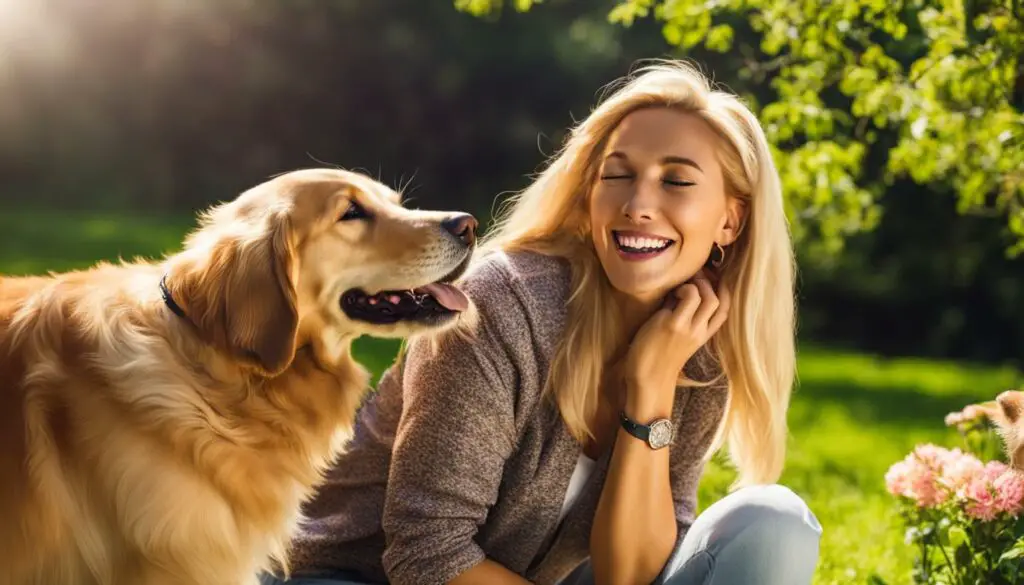
Stress Relief for Dogs: Understanding the Connection with Licking
Stress can affect dogs just as it affects humans, and licking is one way that dogs naturally relieve stress. When a dog licks, it releases endorphins, which are feel-good hormones that promote relaxation and comfort. This self-soothing behavior helps dogs cope with anxiety, tension, and even boredom.
Excessive licking, however, can be problematic and may indicate persistent stress or underlying issues. It’s important for dog owners to pay attention to their pet’s licking behavior and identify any potential triggers or sources of stress. This could include changes in the environment, such as a new pet or a recent move, as well as separation anxiety or a lack of mental stimulation.
To help dogs find alternative ways to relieve stress, it’s important to provide them with other activities and outlets. This can include regular exercise, interactive toys, and positive reinforcement training. Creating a calm and safe environment for the dog, with plenty of mental and physical stimulation, can also help reduce stress and minimize excessive licking.
| Signs of Stress in Dogs | Ways to Relieve Stress |
|---|---|
|
|
|
|
By understanding the connection between stress and licking behavior, dog owners can take proactive steps to provide their pets with the support and care they need. Creating a stress-free environment and engaging in stress-relief activities can help minimize excessive licking and promote a happier, healthier canine companion.
Reinforcement
When it comes to understanding why dogs lick their owners’ faces, reinforcement plays a significant role in this behavior. Dogs may lick their owners as a way to seek attention, petting, or even treats. If a dog’s licking behavior is unintentionally or intentionally rewarded by their owners, they are likely to repeat this behavior in the future.
To prevent excessive licking and encourage alternative forms of showing affection, positive reinforcement techniques can be employed. By consistently rewarding desired behaviors and redirecting attention when the dog starts to lick, owners can help their dogs understand which behaviors are acceptable and which are not.
Training Tips for Reducing Licking Behavior:
- Teach your dog basic obedience commands like ‘sit’ and ‘stay’ to redirect their attention.
- Provide engaging toys and puzzles to keep your dog mentally stimulated.
- Establish a consistent routine to help your dog feel secure and reduce anxiety.
- Ensure your dog gets enough physical exercise to help alleviate stress.
- Use positive reinforcement such as treats, praise, and affection when your dog shows alternative behaviors.
- Consult with a professional dog trainer or behaviorist for additional guidance and support.
Remember, each dog is unique, so it’s essential to tailor the training approach to their specific needs and behavior. Consistency, clear communication, and positive reinforcement are key to helping your dog reduce excessive licking and find alternative ways to show affection.
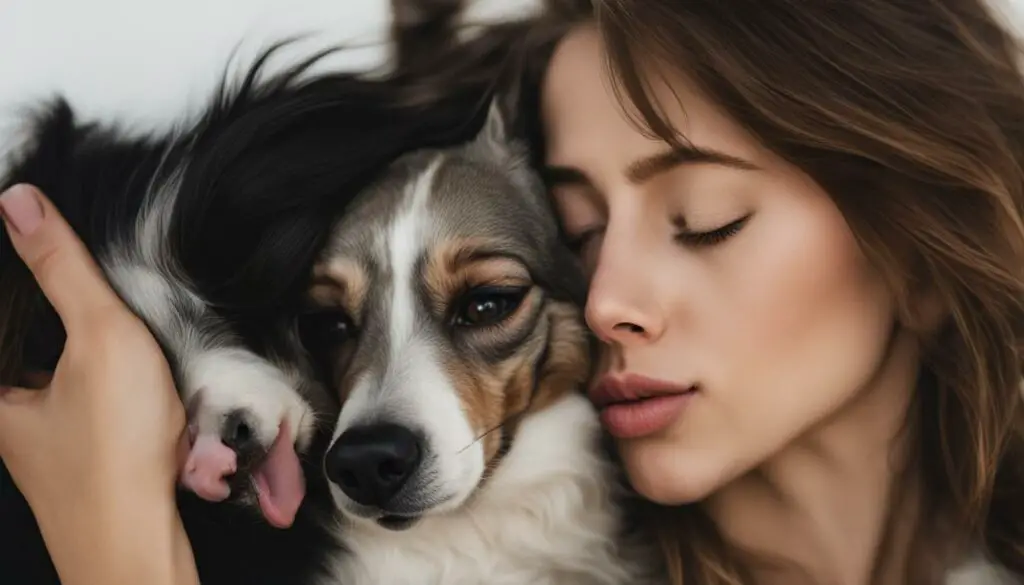
Health Issues
While dogs licking their owners’ faces is usually a harmless behavior, it’s important to be aware of potential health risks associated with dog licking behavior. Dogs’ mouths contain bacteria, and their saliva can potentially transmit certain diseases to humans. Therefore, it’s essential to take precautions and understand the possible health issues that may arise.
One common health concern is dental problems. If your dog has dental issues such as gum disease or tooth decay, their saliva may contain harmful bacteria that can be transferred through licking. Additionally, dogs with poor oral hygiene may have a higher risk of periodontal disease, which can also affect their saliva.
Another health issue to consider is allergies. Some dogs may have allergies that cause skin irritation, leading to excessive licking. This can result in a cycle of inflammation and worsen the symptoms. It’s important to identify and manage any allergies your dog may have to prevent discomfort and potential complications.
“Dogs’ mouths contain bacteria, and their saliva can potentially transmit certain diseases to humans.”
| Health Issue | Description |
|---|---|
| Dental Problems | Issues such as gum disease or tooth decay can lead to bacteria in the dog’s saliva. |
| Allergies | Allergic reactions can cause skin irritation, leading to excessive licking. |
| Skin Conditions | Certain skin conditions, such as dermatitis, can result in increased licking behavior. |
| Gastrointestinal Distress | Dogs experiencing digestive issues may lick excessively as a sign of discomfort. |
| Pain or Discomfort | In some cases, dogs may lick as a response to pain or discomfort in their bodies. |
Additionally, dogs with certain skin conditions, such as dermatitis, may be more prone to excessive licking. These conditions can cause itchiness and discomfort, leading dogs to lick their skin as a way to alleviate the symptoms.
Furthermore, gastrointestinal distress can also manifest through excessive licking. Dogs may lick as a sign of discomfort in their stomach or digestive tract. If your dog’s licking behavior is persistent and accompanied by other symptoms such as vomiting or diarrhea, it’s important to consult with a veterinarian to determine the underlying cause and provide appropriate treatment.
When Licking is a Problem?
Dogs licking their owners’ faces is a common behavior that serves various purposes, including communication, grooming, and showing affection. However, excessive or obsessive licking can indicate underlying issues and become a problem. It’s crucial for dog owners to understand the signs and take appropriate action to address this behavior.
Signs of Excessive Licking
Excessive licking may manifest in several ways, such as constant licking of the owner’s face or body, repetitive licking of specific body parts, or persistent licking even when there is no apparent reason. If you notice any of these signs in your dog, it’s important to investigate further.
Possible Causes
There are several possible causes for excessive licking in dogs. These include allergies, skin irritations or infections, anxiety or stress, pain or discomfort, and even certain medical conditions. It’s essential to consult with a veterinarian to determine the underlying cause and develop an appropriate treatment plan.
Addressing Excessive Licking
To address excessive licking, it’s important to address the root cause. This may involve implementing behavioral modification techniques, providing appropriate medical treatment, or using deterrents to discourage the behavior. Additionally, providing mental and physical stimulation, regular exercise, and a balanced diet can help reduce anxiety and promote overall well-being in dogs.
| Possible Causes of Excessive Licking | Treatment Options |
|---|---|
| Allergies | Identify and avoid allergens, consider allergy testing and immunotherapy |
| Skin Irritations or Infections | Treat underlying skin condition, use medicated shampoos or creams as recommended by a veterinarian |
| Anxiety or Stress | Implement behavior modification techniques, provide mental and physical stimulation, consider anxiety-reducing supplements or medications under veterinary guidance |
| Pain or Discomfort | Identify and treat underlying medical condition or pain, provide appropriate pain management |
| Medical Conditions | Consult with a veterinarian for a thorough examination and appropriate treatment |
It’s important to note that excessive licking can vary from dog to dog, and each case should be evaluated individually. Consulting with a veterinarian is essential to determine the cause and develop an appropriate treatment plan to address the excessive licking behavior in your dog.
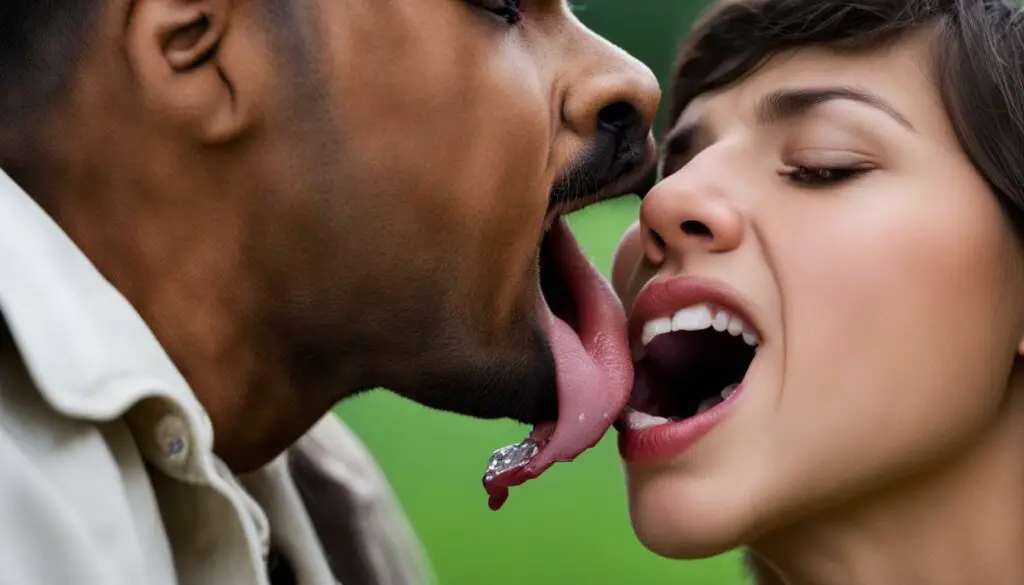
By understanding the reasons behind excessive licking and taking necessary steps to address it, dog owners can ensure their furry companions lead happy, healthy, and stress-free lives.
Helping the Dog About Problem Licking
Excessive licking behavior in dogs, particularly when directed towards their owner’s face, can be concerning. However, there are several steps you can take to address this issue and prevent your dog from licking your face excessively.
1. Identify the underlying cause: Excessive licking can be caused by various factors, such as anxiety, boredom, or a medical condition. Observe your dog’s behavior and consult with a veterinarian to determine the root cause of the excessive licking.
2. Provide distractions and mental stimulation: Keep your dog mentally stimulated by providing interactive toys, puzzles, and chew toys. Engage in regular play sessions and training activities to keep your dog’s mind occupied.
3. Maintain a consistent routine: Dogs thrive on routine, so establishing a consistent feeding, exercise, and play schedule can help reduce stress and anxiety, which may contribute to excessive licking.
4. Ensure proper exercise: Regular physical exercise is essential to keep your dog physically and mentally stimulated. Take your dog for daily walks, engage in playtime, and provide opportunities for them to run and explore.
5. Practice positive reinforcement: Reward your dog for desirable behaviors, such as sitting calmly or redirecting their attention away from licking. Use treats, praise, and affection to reinforce positive behaviors and discourage excessive licking.
6. Provide environmental enrichment: Create a stimulating environment for your dog by incorporating toys, puzzles, and interactive feeding devices. This will help keep their mind engaged and reduce the likelihood of excessive licking.
7. Use deterrents when necessary: If your dog persistently licks your face despite your efforts, you can use deterrents such as bitter sprays or a gentle deterrent collar to discourage the behavior. Consult with a professional dog trainer or veterinarian for guidance on the appropriate use of deterrents.
Remember, every dog is unique, so it may take time and patience to find the most effective approach to address excessive licking. By implementing these steps and seeking professional guidance when needed, you can help your dog overcome problem licking and maintain a healthy and balanced behavior.

Table: Summary of Steps to Prevent Excessive Dog Licking
| Steps | Description |
|---|---|
| Identify the underlying cause | Observe behavior and consult with a veterinarian to determine the root cause |
| Provide distractions and mental stimulation | Offer interactive toys, puzzles, and engage in regular play sessions |
| Maintain a consistent routine | Establish a regular feeding, exercise, and play schedule |
| Ensure proper exercise | Take your dog for daily walks, engage in playtime, and provide opportunities for physical activity |
| Practice positive reinforcement | Reward desirable behaviors and discourage excessive licking |
| Provide environmental enrichment | Incorporate stimulating toys and interactive feeding devices |
| Use deterrents when necessary | Consider bitter sprays or gentle deterrent collars |
Is it normal for dogs to lick themselves excessively?
Excessive self-licking can be a cause for concern in dogs, as it may indicate underlying issues such as allergies, skin conditions, or anxiety. While licking is a natural behavior for dogs, obsessive or constant licking can lead to skin irritation, hair loss, and other problems. It is important for pet owners to observe their dog’s licking behavior and determine if it falls within normal limits.
If you notice that your dog is constantly licking a specific area, such as their paws, it could be a sign of discomfort or irritation. Allergies or skin infections may be the cause of such behavior. Consulting with a veterinarian can help identify the underlying cause and provide appropriate treatment.
In some cases, excessive self-licking can be a sign of anxiety or stress in dogs. Dogs may resort to licking as a way to self-soothe and alleviate their anxiety. It’s important to address the underlying cause of the anxiety and provide your dog with proper mental stimulation and environmental enrichment to help reduce their stress levels.
Table: Common Causes of Excessive Self-Licking in Dogs
| Cause | Symptoms | Treatment |
|---|---|---|
| Allergies | Itching, redness, inflammation | Identify allergens, medication, hypoallergenic diet |
| Skin Infections | Redness, swelling, discharge | Antibiotics, medicated shampoos |
| Anxiety/Stress | Excessive licking, pacing, restlessness | Behavioral training, anxiety management techniques |
| Parasites | Scratching, visible parasites on the skin | Antiparasitic medication, regular grooming |
Excessive self-licking can have underlying health or behavioral causes. It is important for pet owners to monitor their dog’s behavior and seek veterinary advice if excessive licking is observed.
Remember, every dog is unique, and what might be considered excessive licking for one dog may be normal for another. If you are unsure about your dog’s licking behavior, it is always best to consult with a veterinarian who can provide guidance and address any concerns you may have. By taking proactive measures to understand and address excessive licking, you can ensure the health and well-being of your furry friend.
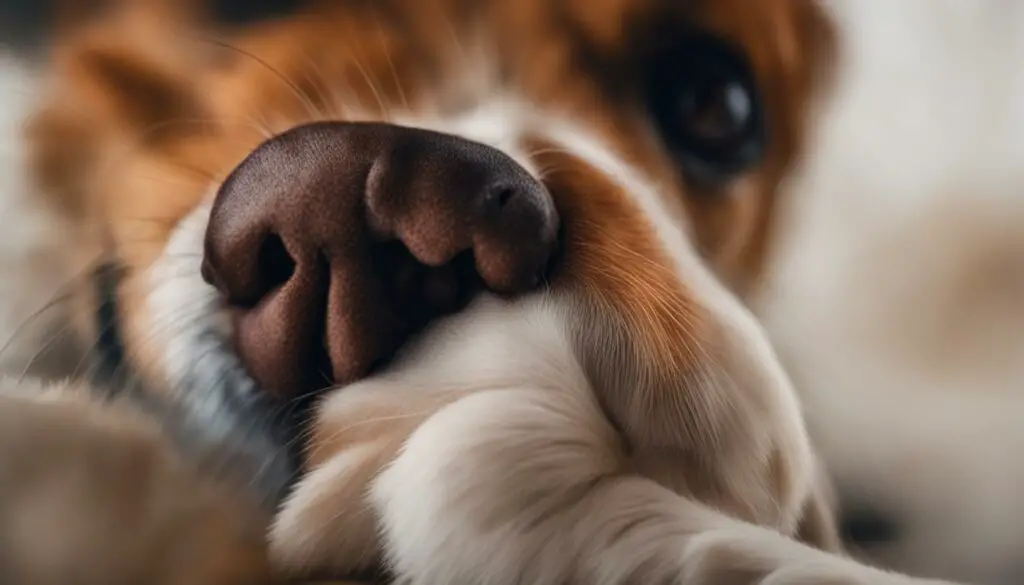
Conclusion
In conclusion, understanding why dogs lick their owners’ faces is crucial for building a strong and loving bond with our furry companions. Dog licking behavior serves various purposes, such as communication, grooming, and showing affection. By licking, dogs can convey their needs, seek attention, and express their love and trust.
It’s important for dog owners to pay attention to their pet’s licking behavior and observe any changes or excessive licking that may indicate underlying health or behavioral issues. Consulting with a veterinarian can help rule out any potential problems and provide appropriate guidance and solutions.
With proper care, attention, and training, excessive or problematic licking can be addressed. Understanding the reasons behind this behavior and taking steps to redirect it when necessary will contribute to a healthy and harmonious relationship between dog and owner.
So the next time your dog licks your face, remember that it’s their way of communicating, bonding, and showing affection. Embrace this gesture as a sign of their love and devotion, and continue to provide them with the care and attention they deserve.
FAQ
Why does my dog lick my face?
Dogs lick their owners’ faces for various reasons, including communication, grooming, and showing affection. It’s a normal behavior that helps dogs bond with their owners.
What does it mean when a dog licks your face?
When a dog licks your face, it can mean they are expressing their love, trust, and loyalty. It can also be a way for them to seek attention, communicate their needs, or show their affection.
Is it safe for dogs to lick your face?
Generally, it is safe for dogs to lick their owners’ faces. However, it’s important to be mindful of any potential health risks, such as bacteria or parasites that can be transferred through their saliva. Regular veterinary care and ensuring proper hygiene are essential.
How can I discourage my dog from licking my face?
If you want to discourage your dog from licking your face, you can redirect their behavior by offering them an alternative, such as a chew toy or a treat. Consistency and positive reinforcement training can help teach your dog appropriate boundaries.
Why does my dog excessively lick themselves?
Excessive self-licking in dogs can be a sign of underlying health issues, allergies, anxiety, or skin conditions. It’s important to observe their behavior and consult with a veterinarian if you notice persistent excessive licking.
How can I address excessive licking in my dog?
To address excessive licking in your dog, you should identify and address the underlying cause, provide distractions and mental stimulation, maintain a consistent routine, ensure proper exercise, practice positive reinforcement, and consult with a veterinarian if necessary.
When should I be concerned about my dog’s licking behavior?
You should be concerned about your dog’s licking behavior if it becomes excessive, obsessive, or is accompanied by other symptoms such as skin irritation, hair loss, or changes in appetite or behavior. Consulting with a veterinarian can help determine if there are any underlying health issues.
Can dogs get sick from licking humans?
While it’s rare, dogs can transmit certain bacteria or parasites to humans through licking. Maintaining good hygiene, regular veterinary care, and avoiding contact with open wounds or compromised immune systems can help minimize any potential risks.
Is it normal for dogs to lick their owners’ faces?
Yes, it is normal for dogs to lick their owners’ faces. Licking is a natural behavior for dogs, and it often signals their desire for interaction and affection with their owners.
How can I strengthen the bond with my dog?
To strengthen the bond with your dog, you can spend quality time together, engage in positive reinforcement training, provide mental and physical stimulation, and show them love and affection in ways that are comfortable for both you and your dog.








